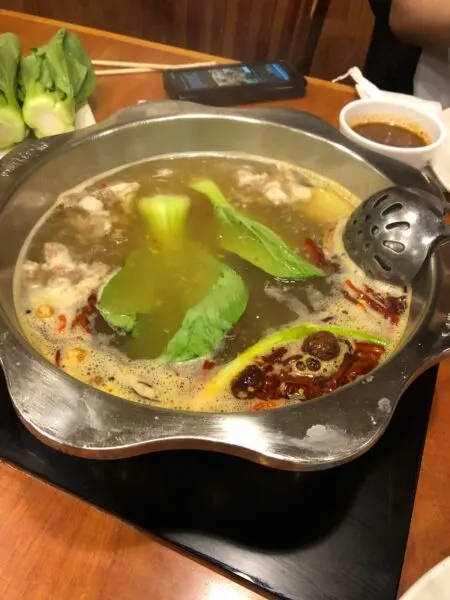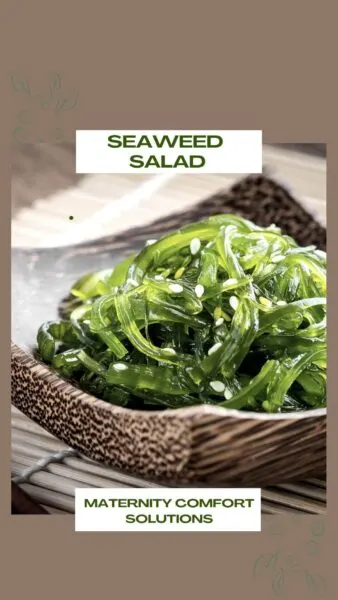Updated May 8, 2023
During pregnancy, it’s important to eat a healthy and balanced diet.
This includes plenty of fruits and vegetables, whole grains, lean proteins, and healthy fats.
Some women may wonder is it safe to eat miso soup while pregnant?
“I’m craving miso soup pregnant, can I eat it?”
This is a question that we asked our OB/GYN, Dr.Doug Penta, MD.
He explained that generally, miso soup is safe during pregnancy, but that it depends on how it is prepared and what other food items are added to the soup.
I know that I wondered about the safety of eating fermented foods while pregnant and was happy to find that most were safe as long as some simple precautions were taken.
It turns out the same is true with miso soup during pregnancy!

In this blog post, we’ll explore the safety of miso soup during pregnancy and provide some tips on how to enjoy this delicious soup safely while expecting.
Is it safe to eat Miso soup while pregnant?
Yes. miso soup is safe to eat while pregnant.
Miso soup is made with a fermented paste called miso.
This paste is made from soybeans, rice, barley, and other grains.
Miso soup has been a staple of the Japanese diet for centuries and is considered to be a healthy dish.
The fermentation process that creates miso paste breaks down the complex carbohydrates into simple sugars, making them easier for the body to absorb.
Miso soup is also a good source of protein, vitamins, and minerals.
Pregnant women can safely eat miso soup.
However, there are a few things to keep in mind.
First, it is safer to choose a store-bought miso soup like Annie Chun’s Miso Soup bowls than it is to eat a homemade one during pregnancy.
It is safer because the store-bought canned or pre-packaged soup is pasteurized.
You will rarely hear us say that store-bought is better than homemade for anything, but in this case, it is simply safer.
I get mine at Kroger.
Most grocery chains carry Annie Chun’s brand as it is popular.
It is important to choose pasteurized over unpasteurized foods during pregnancy.
When we are pregnant we become immune-compromised and are at higher risk of food-borne illnesses, such as Listeria and Salmonella.
Pasteurization kills off harmful bacteria like Listeria.
Store-bought Miso soup is a better option to eat while you are pregnant.
Make sure to cook your soup until it is thoroughly heated.
Second, be sure to add plenty of vegetables to your soup for added nutrients.
Add your favorite vegetables and cooked meats, and fish.
Here are a few delicious and safe additions that you can add to your miso soup while pregnant:
- Tofu
- Cooked Seaweed
- Snap peas
- Green beans
- Green onions
- Cooked rice
- Cooked noodles
- Spinach or Kale
- Cooked Chicken
- Cooked Fish
Third, avoid adding any ingredients to the soup that may not be safe for pregnant women, such as raw fish or shellfish.
Finally, avoid eating miso soup every day, as it is high in sodium.
Drink plenty of water and other fluids throughout the day.
If you have to watch your sodium intake, it is best to skip miso soup during pregnancy.
There are many delicious and safe additions that you can add to your miso soup while pregnant.
Miso soup is a healthy and delicious way to nourish your body during pregnancy.
Of course, If you have any questions or concerns about eating miso soup while pregnant, be sure to speak with your healthcare provider.

Photo: Maternity Comfort solutions
Miso soup benefits
Miso soup is a traditional Japanese dish made from miso paste, dashi or chicken stock, and some chopped vegetables.
It’s usually served hot, but can also be eaten cold.
Although it’s most commonly enjoyed as a winter dish, miso soup has lots of benefits that make it worth enjoying all year round.
Keep reading to find out what they are!
7 Amazing Benefits of Miso Soup
1. Miso soup is a great source of protein and vitamins
Miso soup is an excellent source of protein and vitamins.
The vitamins in miso soup include vitamins A, B, and C.
These vitamins are essential for the body and help keep the immune system strong.
Vitamin A helps to protect the eyes and skin, while vitamin B helps to convert food into energy.
Vitamin C helps to repair tissues and keep the body healthy.
2. It can help you stay hydrated and full.
Miso soup can help you stay hydrated and full because it is a low-calorie soup that is packed with nutrients.
The soup is also a good source of fiber, which helps to keep you feeling full.
The electrolytes in miso soup can also help to replenish the body after a workout or during periods of dehydration.
3. It’s a low-calorie food that is also low in sugar.
Miso soup is a low-calorie food because it is made with water, soybeans, and salt.
The soup is also low in sugar because it does not contain any added sweeteners.
The low calorie and sugar content of miso soup make it a great choice for those who are trying to cut down on their sugar intake or have gestational diabetes.
4. It can help you get your daily recommended intake of soy.
Soy is a good source of protein, fiber, vitamins, and minerals.
It is also low in saturated fat and cholesterol.
The health benefits of soy include reducing the risk of heart disease, stroke, and cancer.
Miso soup is a good way to get your daily recommended intake of soy because it is made with soybeans.
5. It may help reduce the risk of some types of cancer.
Miso soup may help reduce the risk of cancer because it is a good source of antioxidants and phytochemicals.
Antioxidants help to protect cells from damage, while phytochemicals help to fight against cancer-causing agents.
6. Miso soup can help you get your daily recommended intake of vegetables.
Miso soup can help you get your daily intake of vegetables because it is made with a variety of vegetables, including carrots, onions, and celery.
The soup is also a good source of vitamins and minerals.
The vegetables in miso soup can also help to boost the immune system and protect against diseases.
7. It’s a versatile dish that can be easily customized.
Miso soup is a versatile dish that can be easily customized to your liking.
You can add different kinds of vegetables, meats, or seafood to the soup to make it more hearty and filling.
You can also adjust the level of spice and flavor to suit your taste.
Miso soup is a great way to get your daily recommended intake of vegetables and protein.
Miso soup recipe Ideas:
- Miso soup with tofu and seaweed
- Mushroom miso soup
- Green onion miso soup
- Miso soup with rice
- Miso soup with noodles
- Vegetable miso soup
- Chicken miso soup (for non-vegetarians)
Is miso soup good for morning sickness?
You might find it helpful to try miso soup if you suffer from morning sickness.
The soup is said to be high in protein and fiber and is believed to be helpful in treating nausea and vomiting that can occur in early pregnancy.
We think any broth-like soup can be helpful for morning sickness and if you enjoy miso soup, it wouldn’t hurt to try it.
Can I eat miso soup while breastfeeding?
While there is no definitive answer, it is generally considered safe to eat miso soup while breastfeeding.
Miso is a fermented soybean paste that is commonly used in Asian cuisine.
It is rich in protein and other nutrients and has been shown to offer some health benefits, including reduced inflammation and improved gut health.
However, miso soup also contains high levels of sodium, so it is important to consume it in moderation.
You want to make sure you are drinking plenty of fluids while breastfeeding.
Maintaining proper hydration helps keep breast milk production high.
Eating soups are an excellent way to help boost your fluid intake.
Does miso need to be pasteurized?
While most of us are familiar with miso soup, many people don’t know that there are actually several different types of miso.
Miso is a fermented paste made from soybeans, and the type of miso depends on the ratio of soybeans to rice, the length of fermentation, and the addition of other ingredients like salt or alcohol.
Recently, there has been some debate about whether or not miso needs to be pasteurized.
While all commercial brands of miso are pasteurized, traditional methods of making miso do not involve pasteurization.
Proponents of unpasteurized miso argue that it has more beneficial bacteria, while opponents say that unpasteurized miso can lead to food poisoning.
Ultimately, it is best to eat miso that has been pasteurized during pregnancy.
Is tofu safe during pregnancy?
Most pregnant women worry at some point about whether the foods they’re eating are safe for their baby.
And with good reason – what you eat during pregnancy can have a big impact on your baby’s health.
So, it’s no surprise that many expectant mothers have questions about tofu.
Tofu is a popular meat alternative that is made from soybeans.
It is high in protein and low in calories, making it a great option for pregnant women.
However, many people worry that tofu may not be safe for pregnant women to consume.
There is no need to worry about eating tofu during pregnancy.
Soybeans are a healthy food that is packed with nutrients like protein, fiber, and vitamins.
In fact, the American College of Obstetricians and Gynecologists suggests that pregnant women eat soy foods like tofu as part of a healthy diet during pregnancy.
Is seaweed safe during pregnancy?
Seaweed is a type of marine algae that offers a variety of health benefits, including being a good source of vitamins and minerals.
It is also a low-calorie food.
Some people worry that seaweed is not safe during pregnancy because it contains high levels of iodine.
However, iodine is an essential micronutrient for pregnant women, and seaweed is actually a good source of iodine.
The body needs iodine to make thyroid hormones, which are important for the development of the baby’s brain and nervous system.
Seaweed should be consumed in moderation though.
Wakame is a dark green seaweed (also called sea mustard) that is the most common seaweed used in miso soup.
Seaweed is also a good source of folic acid, which is important for the development of the neural tube.
For these reasons, eating seaweed during pregnancy is safe and can even be beneficial.

Common symptoms of a severe foodborne illness from eating fermented foods and undercooked meats are:
- Nausea
- Vomiting
- Diarrhea
- Stomach cramps
- Fever
List of foods to not eat when pregnant:
- Foods that are not pasteurized– certain types of cheese like soft cheeses, Brie, Blue Cheese, etc.
- Certain types of fish– shark, swordfish, anything high in mercury
- Raw eggs including egg nog, hollandaise sauce, homemade mayonnaise, and runny eggs.
- Undercooked meats– lunch meats.
- Hot foods that are not “hot”, avoid hot foods that have been sitting out without a warming source. Same for foods that should be eaten cold. If there is no ice or refrigeration source keeping the food cold, take a pass.
- Caffeine– soda, chocolate. (Limit your caffeine to less than 200 mg a day)
- Herbal Teas (There are so many ingredients in herbal teas so it is best to avoid them simply. Green tea is OK.)
List of Foods you should eat during pregnancy:
- Avocado
- Oatmeal
- Pinto Beans
- Arugula
- Bananas
- Dark Green Leafy Vegetables
- Brussel sprouts
- Carrots
- Green Beans
- Eggs
- Lean Meats
What should a pregnant woman eat daily?
A pregnant woman needs to consume a variety of nutrients every day to support both her own health and the development of her baby.
Protein is essential for building new tissue and can be found in meat, poultry, fish, legumes, and eggs.
Calcium is necessary for strong bones and teeth and is especially important during the third trimester when the baby’s skeleton is rapidly developing.
Pregnant women should aim to get 1000 mg of calcium per day from low-fat dairy products such as milk, yogurt, and cheese.
Iron is also important for the formation of new blood cells, and pregnant women need about 27 mg of iron per day.
Final Thoughts
So is it safe to eat miso soup while pregnant? The answer is a resounding yes!
As long as you’re not allergic to soy, miso soup is a great way to get important nutrients like vitamin A, vitamin C, and folate.
It also happens to be delicious and comforting, making it the perfect dish for pregnancy.


